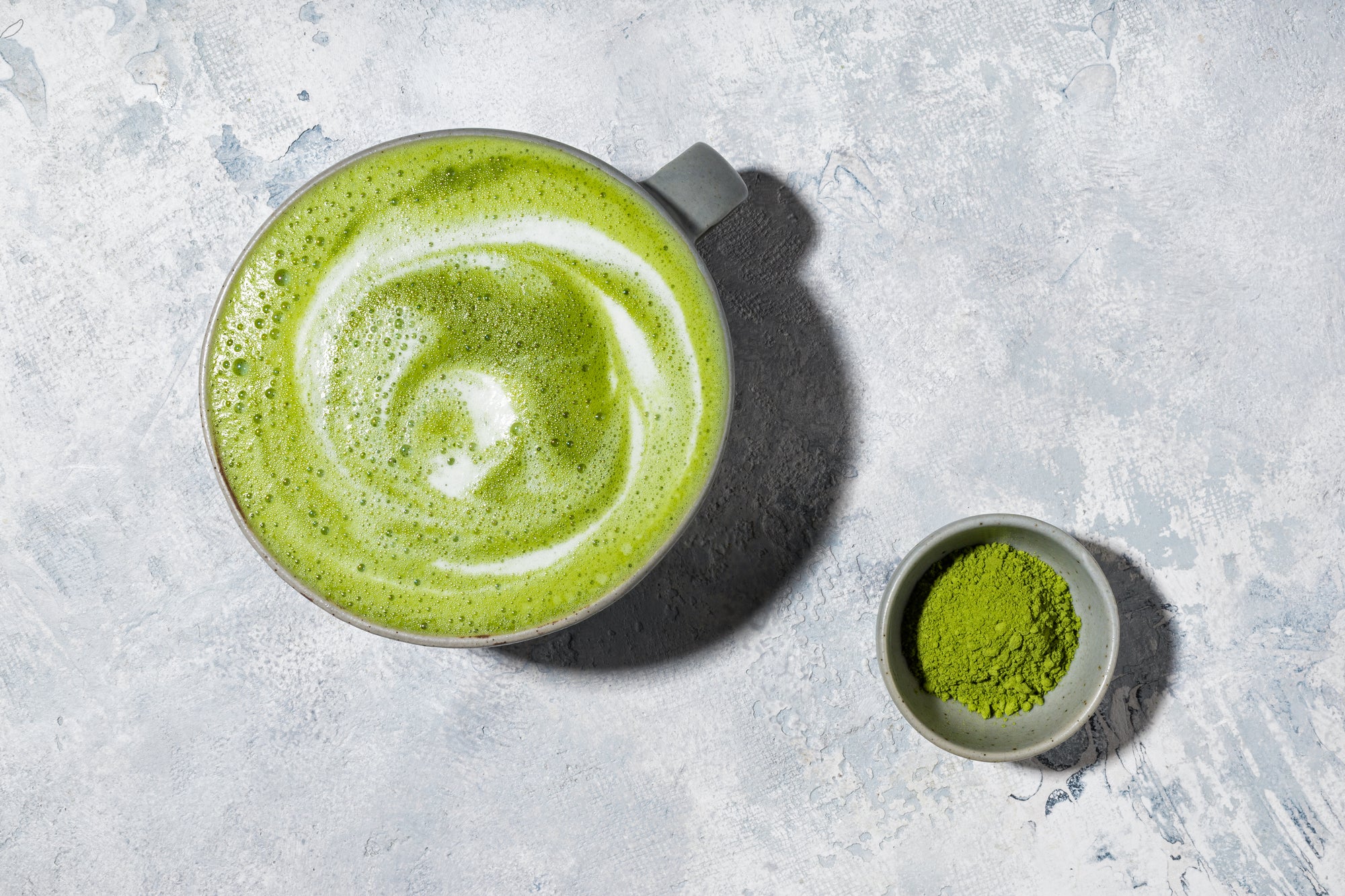
Maybe you’re already familiar with the vibrant green color of matcha powder, and maybe you love sipping on a delicious matcha latte, hot or iced — but you aren’t quite sure whether matcha truly lives up to all the hype.
Aside from its stunning color, matcha also has a unique, complex flavor profile and a multitude of potential health benefits. So today, we’re diving into all things matcha.
Below, we’ll take a closer look at matcha, how it stacks up against other fan-favorite caffeinated beverages, and how it might fit into your daily routine. Let’s get into it.
What Is Matcha?
Matcha is a special type of green tea made by grinding shade-grown tea leaves from the Camellia sinensis plant into a very fine powder using traditional stone mills.
This is the same plant that white, black, and oolong tea come from. However, these teas differ from matcha when it comes to oxidation and processing: black tea leaves are left to fully oxidize, while oolong is semi-oxidized, green tea is minimally oxidized, and white tea oxidizes the least out of all four teas and is also the least processed.
Think of oxidation and processing as the reason for a darker, stronger-tasting tea — this is why black tea and oolong tea have a much bolder flavor than green or white tea.
Another difference between matcha and other teas – whether green or any other color – is that while these other teas are made by steeping the leaves in hot water to create an infusion, matcha is made by thoroughly whisking the finely ground powder into water. The result is a delicious drink with a dense concentration of nutrients and antioxidants, because all of the goodness remains in the cup, not the tea bag!

Tea plants used to make matcha are grown in the shade in order to protect the leaves from the sun’s nutrient-leaching effects. As a result, large amounts of nutrients — including chlorophyll — remain concentrated in the leaves, which gives matcha its rich green color. This high chlorophyll content also contributes to matcha’s health benefits: chlorophyll supports natural detoxification processes, assisting the proper elimination of harmful toxins from the body.
Matcha has been a cherished element of Japanese culture and tradition for many centuries. This tea was first used in spiritual tea ceremonies in Japan — this is why the highest grade of matcha is called ceremonial grade matcha.
Today, though, many people around the world drink matcha for its unique taste and undeniable health benefits.

Grades of Matcha
Is all matcha created equal? Definitely not! During winter, tea buds hibernate and store large amounts of nutrients and other active compounds waiting for spring to arrive. The first harvest of leaves picked in the spring — used for ceremonial-grade matcha — contains increased levels of nutrients, and results in matcha that’s full-bodied, smooth, just mildly grassy and not bitter.
On the other hand, second harvest leaves subsequently harvested won’t be as high quality as the first harvest, and are often used for loose leaf tea or culinary grade matcha. That’s why ceremonial-grade matcha is best suited for the ceremonial style of drinking matcha (with water only), while culinary-grade is perfect for baking, making lattes or adding to smoothies.
Does Matcha Have Caffeine?
Yes, matcha contains caffeine. In fact, it’s one of the most abundant sources of caffeine in the whole tea family, and has a higher caffeine content than other green teas. That said, not every cup of matcha has the same amount of caffeine. The amount can differ depending on weather conditions during the tea plant’s life, growing and harvesting practices, and the specific type of matcha used.
Generally, the caffeine content in matcha ranges from 18.9 to 44.4 mg per gram of matcha, and one matcha drink is typically prepared using one to two grams of matcha.

Does Matcha Have More Caffeine Than Coffee and Other Teas?
So where does matcha sit on the caffeine spectrum?
Here’s a breakdown of popular drinks that contain caffeine:
- An average eight-ounce cup of coffee contains around 98 to 180 mg of caffeine.
- A shot of espresso can contain between 45 and 70 mg of caffeine.
- An average eight-ounce cup of black tea has between 25 to 50 mg of caffeine.
- Standard green tea comes in at 25 to 30 mg of caffeine.
The caffeine levels in these beverages can vary due to factors like origin of the coffee beans or tea leaves, processing and roast level, as well as the preparation and brewing time.
Matcha drinks typically contain a comparable amount of caffeine to that in an average cup of coffee or a can of soda. Why, then, do so many people prefer matcha over other popular sources of caffeine? It mainly has to do with how that caffeine is absorbed by, and impacts, the body.

How Does Caffeine Affect the Body?
Caffeine is a central nervous system stimulant that can make you feel more awake, alert and focused. But how does it work?
There’s a popular misconception that caffeine energizes the body. But in fact, caffeine works by blocking the action of adenosine, a compound that promotes sleep and slows the heart rate. When adenosine is blocked, other neurotransmitters like dopamine and norepinephrine are also indirectly released, which can improve mood, energy levels and cognitive function.
But caffeine isn't all sunshine and rainbows. Consuming too much caffeine on its own can cause jitters, anxiety and even heart palpitations due to these stimulant effects. In fact, when we drink caffeinated beverages, that caffeine is quickly absorbed from the gastrointestinal tract — generally, around 99 percent of caffeine consumed is absorbed by our bodies in just 45 minutes. This is why you might feel jittery after consuming your cup of joe.
Luckily, matcha tea has a secret ingredient called L-theanine, which can help block those caffeine jitters.
L-theanine is an amino acid that’s naturally found almost exclusively in tea leaves (and is particularly concentrated in matcha) that has been shown to have calming effects on the body. It raises the level of brain waves and chemicals that promote focus, creativity and relaxation – but without inducing drowsiness – while it reduces levels of other chemicals that are linked to stress and anxiety.
The combination of L-theanine and caffeine in tea is what makes it unique from other caffeinated drinks. The relaxing effect of L-theanine moderates the stimulating effect of caffeine, allowing you to enjoy alertness and concentration, without the jitters and caffeine crash associated with coffee.
How Much Caffeine Is Safe?
If you’re a coffee lover, fear not — your single, daily cup of Joe isn’t likely to cause negative side effects. As long as caffeine doesn’t usually make you feel nervous, you may be able to have up to 300 mg of caffeine per day without it negatively affecting your health or well-being.
This equates to three to four cups of matcha per day — and that’s great news, if you ask us! But even for matcha lovers, one to two cups a day is a more realistic amount to enjoy.
Just be sure to pay attention to how your body reacts to caffeine, especially if you tend to be more sensitive to it. If you notice yourself getting headaches, having trouble sleeping, or feeling irritable, this may be your body’s way of asking you to scale back your caffeine intake.
Instead of diving right into an ambitious four cups a day, try one serving of matcha in the morning, and if you crave more (perhaps a good early afternoon focus-boosting matcha latte), work your way up from there.

What Are Some Other Health Benefits of Matcha?
So, we’ve covered where matcha comes from and what makes it so special. Now, let’s take a more in-depth look at some of the health benefits of matcha:
High in Antioxidants
Matcha, like many teas, is rich in catechins and polyphenols, a potent group of antioxidant compounds also found in foods such as cacao, red wine, apples and raspberries. Matcha specifically contains high concentrations of the catechin known as epigallocatechin gallate (EGCG), which can have a wide range of benefits.
Antioxidants are powerful substances that can support overall cell health and support your cells against damage caused by free radicals — in other words, they work hard to keep you feeling your best.
May Support Brain Function
Drinking matcha may help support cognitive functioning due to its unique combination of L-theanine and caffeine. Studies have also shown that consuming these compounds together can improve cognitive performance, increase alertness and attention and reduce fatigue.
Many people take L-theanine supplements alongside caffeine — however, you can cut out the unnecessary steps by enjoying nature’s very own blend in a cup of matcha tea.

Matcha From JOYÀ
If you’re ready to ditch coffee and switch to something that can support and nourish your body, JOYÀ has taken certified organic, ceremonial-grade matcha and elevated it even further. The Focus Functional Superblend with matcha is packed with adaptogenic, immune-supporting, cognitive-supporting and energizing ingredients.
Here are some ingredients that work synergistically with matcha in Focus:
Lion’s Mane Mushroom
This functional mushroom, which resembles the shaggy mane of a lion as it grows out of the ground, has many medicinal and culinary uses. It offers numerous potential health benefits, which is why it has become a common ingredient for tea blends. For instance, lion’s mane supports immune function, and early research suggests a number of effects on brain health.
Ashwagandha
Ashwagandha, a prized herb in Ayurveda (traditional Indian medicine), is commonly used for its soothing effects. This anti-inflammatory herb can help soothe swelling, and can also support your immune system, athletic performance and cognitive function.
Ashwagandha is also considered a powerful, calming adaptogen, which means it can support the body’s ability to cope with physical and mental stress and help you feel more relaxed.
Moringa Leaf
The Moringa tree has been consumed for centuries due to its numerous beneficial properties. Moringa leaf contains an impressive amount of important vitamins and minerals, including seven times the amount of vitamin C that can be found in an orange, alongside plenty of potassium, calcium, protein, iron, and antioxidants.
Pine Pollen
As the name suggests, this ingredient is the pollen from pine trees. This nutrient-packed ingredient has been used for medicinal purposes for over 2,000 years.
Pine pollen has a mix of protein, fatty acids, carbohydrates, calcium, magnesium, B vitamins, and vitamin E, which work together to nourish the body and support balanced energy levels.
The JOYÀ Difference
While many supplement and functional food brands sneak synthetic ingredients, fillers, and sweeteners into their products, we at JOYÀ are 100 percent committed to bringing you pure, efficacious products that support everyday wellness. Along with our Focus Superblend, all of our products are free from fillers, additives, refined sugars, artificial sweeteners and artificial flavors.
Our Superblends have also been formulated to fit any dieting protocol or lifestyle — they’re vegan, keto, and paleo-friendly and come in light pouches for easy enjoyment at home or on the road.

The Bottom Line
Matcha tea has about the same amount of caffeine as a cup of coffee. However, many people are switching to matcha for its more balanced effects, numerous health benefits, and unique flavor.
If you want to start incorporating matcha into your daily routine, JOYÀ’s Focus Functional Superblend is a great place to start. Browse our online selection for more wellness supplements to help you feel good all day, every day.
